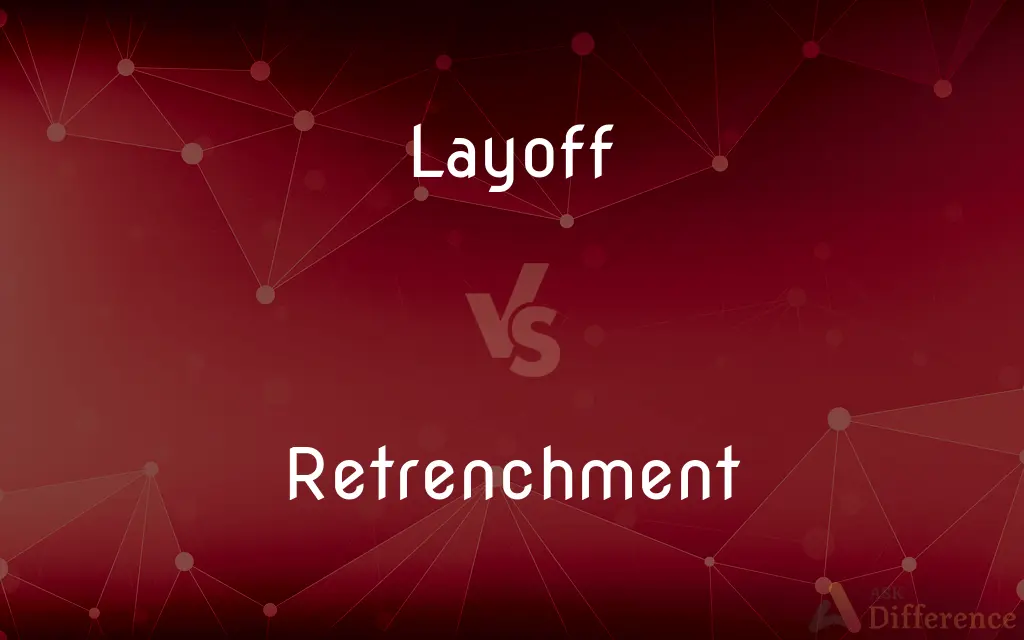Layoff vs. Retrenchment — What's the Difference?
Edited by Tayyaba Rehman — By Fiza Rafique — Updated on September 25, 2023
A layoff is a temporary or permanent removal of employees due to business reasons, while retrenchment is a more permanent reduction in staff for cost-cutting or restructuring.

Difference Between Layoff and Retrenchment
Table of Contents
ADVERTISEMENT
Key Differences
Layoff typically refers to the temporary or sometimes permanent removal of employees from their positions, often due to economic downturns or seasonal changes in the business. This action does not necessarily imply any fault on the part of the employees. On the contrary, retrenchment is often a more deliberate action taken by businesses aiming to cut costs or restructure their operations. It often signifies a more permanent termination of employment, focused on reducing workforce size for the long term.
In the context of a layoff, employees might expect a possibility of rehiring when business conditions improve or during peak seasons. This hope often stems from the transient nature of some layoffs. Retrenchment, however, generally does not come with the same expectations. Once retrenched, employees are less likely to anticipate a call back, as the decision to retrench usually arises from deeper structural changes in the company.
Another distinction between layoff and retrenchment lies in the connotation. Layoffs are often seen as circumstantial, tied to external factors such as market conditions or external crises. Retrenchment tends to have strategic undertones, implying internal decision-making processes aimed at streamlining operations or ensuring the company's survival.
While both layoff and retrenchment are unfortunate situations for employees, understanding the motivations behind each can offer clarity. While layoffs might be a response to short-term challenges, retrenchment suggests a more profound shift in a company's approach or business model.
Comparison Chart
Nature
Can be temporary or permanent
Typically permanent
ADVERTISEMENT
Expectation
Possibility of rehiring
No expectation of rehiring
Cause
External factors like economic downturns
Internal decisions, cost-cutting
Connotation
Circumstantial
Strategic
Impact on Staff
Reduction in staff for short-term challenges
Long-term reduction in workforce
Compare with Definitions
Layoff
A means to manage operational costs temporarily.
The factory layoff was a result of the supply chain disruption.
Retrenchment
A permanent reduction in staff to streamline operations.
The company's merger led to a significant retrenchment.
Layoff
The act of temporarily or permanently suspending employees.
Due to a decrease in demand, the company had to implement a layoff.
Retrenchment
A structural change implying deeper organizational shifts.
Retrenchment was part of their move towards automation.
Layoff
Not necessarily a reflection of employees' performance.
Despite being an excellent worker, John faced a layoff.
Retrenchment
A strategic decision for long-term business viability.
Facing competitive pressures, the firm opted for retrenchment.
Layoff
A response to external economic challenges affecting employment.
The pandemic led to a massive layoff in the hospitality sector.
Retrenchment
Reducing workforce size to manage financial health.
Dwindling profits compelled the company's retrenchment strategy.
Layoff
A layoff or downsizing is the temporary suspension or permanent termination of employment of an employee or, more commonly, a group of employees (collective layoff) for business reasons, such as personnel management or downsizing (reducing the size of) an organization. Originally, layoff referred exclusively to a temporary interruption in work, or employment but this has evolved to a permanent elimination of a position in both British and US English, requiring the addition of "temporary" to specify the original meaning of the word.
Retrenchment
A reflection of internal business decisions and planning.
Their focus on digital services resulted in retrenchment in traditional sectors.
Layoff
The act of suspending or dismissing an employee, as for lack of work or because of corporate reorganization.
Retrenchment
Retrenchment (French: retrenchment, an old form of retranchement, from retrancher, to cut down, cut short) is an act of cutting down or reduction, particularly of public expenditure.
Layoff
A period of temporary inactivity or rest.
Retrenchment
A cutting down or back; reduction.
Layoff
A dismissal of employees from their jobs because of tightened budgetary constraints or work shortage (not due to poor performance or misconduct).
Retrenchment
A curtailment of expenses.
Layoff
A period of time when someone is unavailable for work.
Retrenchment
The act of consolidating one's strength, as for further efforts.
Layoff
A short pass that has been rolled in front of another player for them to kick.
Retrenchment
A curtailment or reduction.
Layoff
A bet that is laid off, i.e. placed with another bookmaker in order to reduce risk.
Retrenchment
(specifically) An act of reducing expenses; economizing.
Layoff
The act of laying off an employee or a work force
Retrenchment
(specifically) An act of terminating the employment of a worker or making an employee redundant, often to reduce expenses; a layoff.
Layoff
An employment break with potential for future rehiring.
She was laid off in winter but was rehired in the peak season.
Retrenchment
A defensive work constructed within a fortification to make it more defensible by allowing defenders to retreat into and fight from it even after the enemy has taken the outer work.
Retrenchment
The act or process of retrenching; as, the retrenchment of words in a writing.
The retrenchment of my expenses will convince you that mean to replace your fortune as far as I can.
Retrenchment
A work constructed within another, to prolong the defense of the position when the enemy has gained possession of the outer work; or to protect the defenders till they can retreat or obtain terms for a capitulation.
Retrenchment
Entrenchment consisting of an additional interior fortification to prolong the defense
Retrenchment
The reduction of expenditures in order to become financial stable
Common Curiosities
Is retrenchment the same as firing?
No, retrenchment is a strategic workforce reduction, while firing is usually due to individual performance or conduct.
Who is more likely to be called back: a laid-off or retrenched employee?
A laid-off employee is more likely to be called back compared to a retrenched one.
Are layoffs always permanent?
No, layoffs can be temporary or permanent based on business needs.
Which action is more temporary in nature?
Layoff is more temporary in nature compared to retrenchment.
Is layoff a reflection of an employee's capabilities?
No, a layoff is often due to external factors and not an employee's performance.
Are employees given notice before a layoff or retrenchment?
Typically, yes. The notice period may vary based on laws and company policies.
Can a laid-off employee be rehired?
Yes, laid-off employees can be rehired when business conditions improve.
Is retrenchment a sign of business failure?
Not necessarily; retrenchment can be a strategic move for long-term business viability.
Is retrenchment more global or region-specific in a company?
Retrenchment can be both global or specific to a region, based on the company's restructuring plans.
Are severance packages common in both layoff and retrenchment?
Yes, both layoffs and retrenchments might offer severance packages, though specifics vary by company and country.
Can external factors cause retrenchment?
While retrenchment is usually strategic, profound external changes can prompt businesses to retrench.
Can economic downturns lead to retrenchment?
Yes, prolonged economic challenges can prompt companies to retrench to maintain viability.
Which action indicates a deeper organizational shift?
Retrenchment often indicates deeper structural or strategic shifts.
How does layoff impact company morale?
Layoffs can adversely affect morale due to job insecurity and concerns over future layoffs.
Do companies prefer layoff or retrenchment during financial crises?
It varies. Companies might start with layoffs and move to retrenchment if financial woes persist.
Share Your Discovery

Previous Comparison
Hawk vs. Kite
Next Comparison
Glass vs. QuartzAuthor Spotlight
Written by
Fiza RafiqueFiza Rafique is a skilled content writer at AskDifference.com, where she meticulously refines and enhances written pieces. Drawing from her vast editorial expertise, Fiza ensures clarity, accuracy, and precision in every article. Passionate about language, she continually seeks to elevate the quality of content for readers worldwide.
Edited by
Tayyaba RehmanTayyaba Rehman is a distinguished writer, currently serving as a primary contributor to askdifference.com. As a researcher in semantics and etymology, Tayyaba's passion for the complexity of languages and their distinctions has found a perfect home on the platform. Tayyaba delves into the intricacies of language, distinguishing between commonly confused words and phrases, thereby providing clarity for readers worldwide.















































